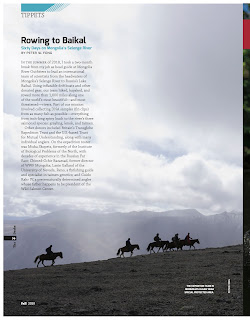When I look back at the past year, I mostly see haze and fog. Which makes the memories that remain gleam like islands of hallucinatory clarity. One of these is of Sarah and I standing in a bar, drinking cold beer and eating a revelatory combination of bread, pork, wine, and garlic known on Madeira as sandwich carne vinho d'alhos. Another is of walking toward Powell's in Portland and seeing my name on the marquee.
That night included an on-stage conversation with the Wild Salmon Center's Ramona DeNies, a question-and-answer session, and many vivid reminders of why I launched the 2018 Baikal Headwaters Expedition in the first place: for the sake of the river.
Although that event went unrecorded, you can listen now to my conversations with Aaron Millar of Armchair Explorer and Tim Harden of The Venturing Angler, with another podcast to come from Chris Mortensen of All Creatures.
Rowing to Baikal was reviewed favorably in Library Journal, Foreword Reviews, Gray's Sporting Journal, Good River Review (by old friend Greg Pape), and Harvard Magazine, among others.
Spurred by alternating bouts of hope and despair emerging from Egypt's COP27, a chapter from an early draft of the book was posted on Rivers without Boundaries.
Another excerpt from the book—with several pages of photos by myself, Lanie Galland, Misha Skopets, and Guido Rahr (now of The Takes)—as well as an interview with Chris Dombrowski, author of The River You Touch, appears in the latest issue of Modern Huntsman.
I returned to the river in June, where the guides and staff of Mongolia River Outfitters continue to work against the threats posed by poaching, habitat degradation, and climate change.
Later in the summer, Sarah and I left Algeria. One of the last things we did there was to visit the cave where the creator of Don Quixote, Miguel de Cervantes, was imprisoned from 1575 to 1577 (though he would not be ransomed until 1580). One of the best things was a close encounter with the Algerian nuthatch, an endemic bird that somehow avoided the attention of European scientists until 1976.
For "What We Talk About When We Talk About Taimen," see issue 37 of In the Loop Magazine.
For an account of my sojourn on Slovenia's River of Dreams, visit Orvis News.





















